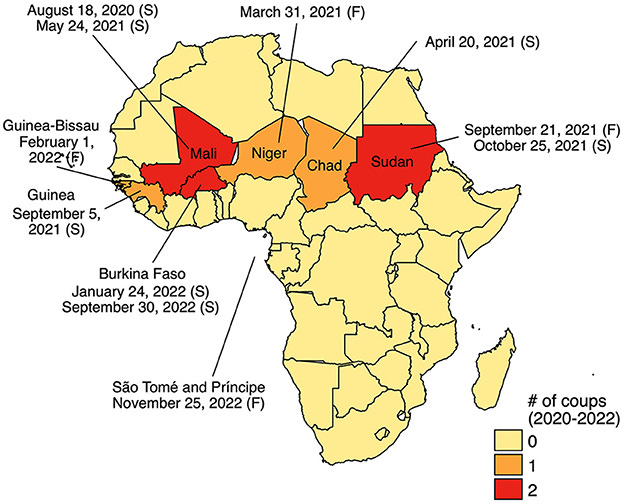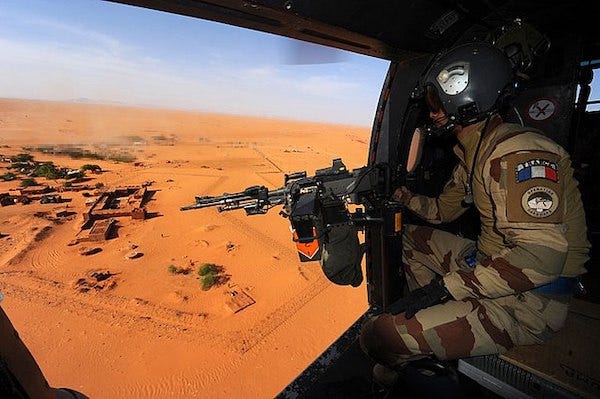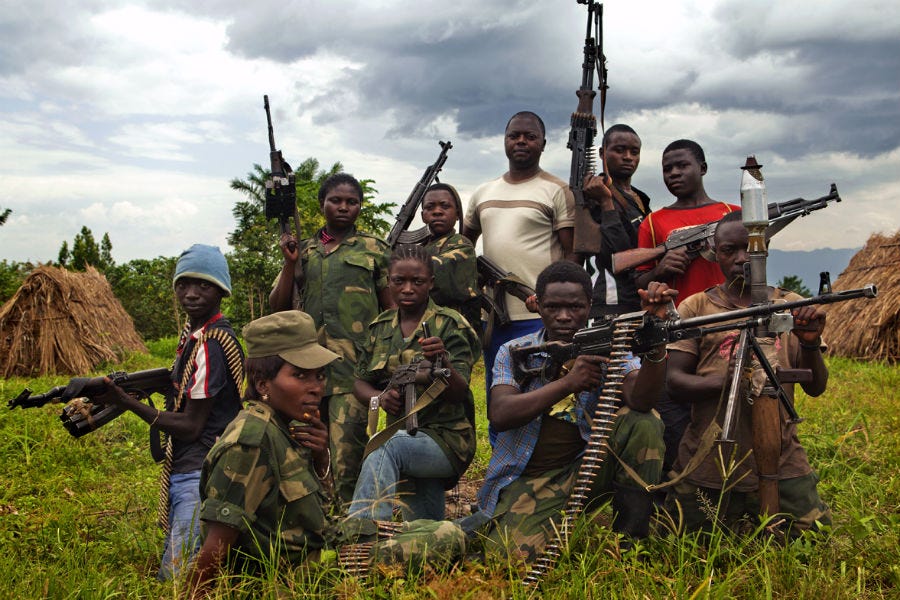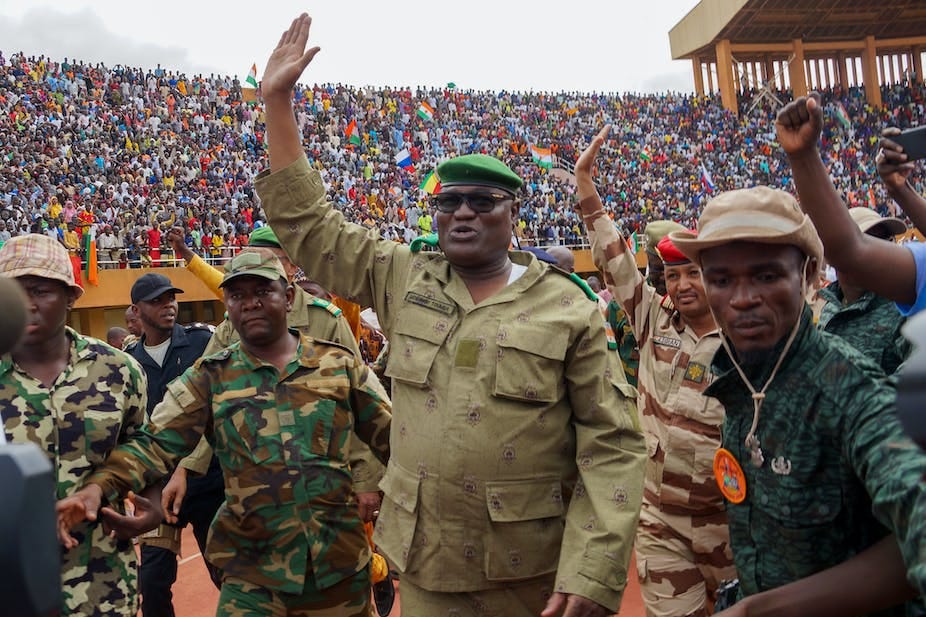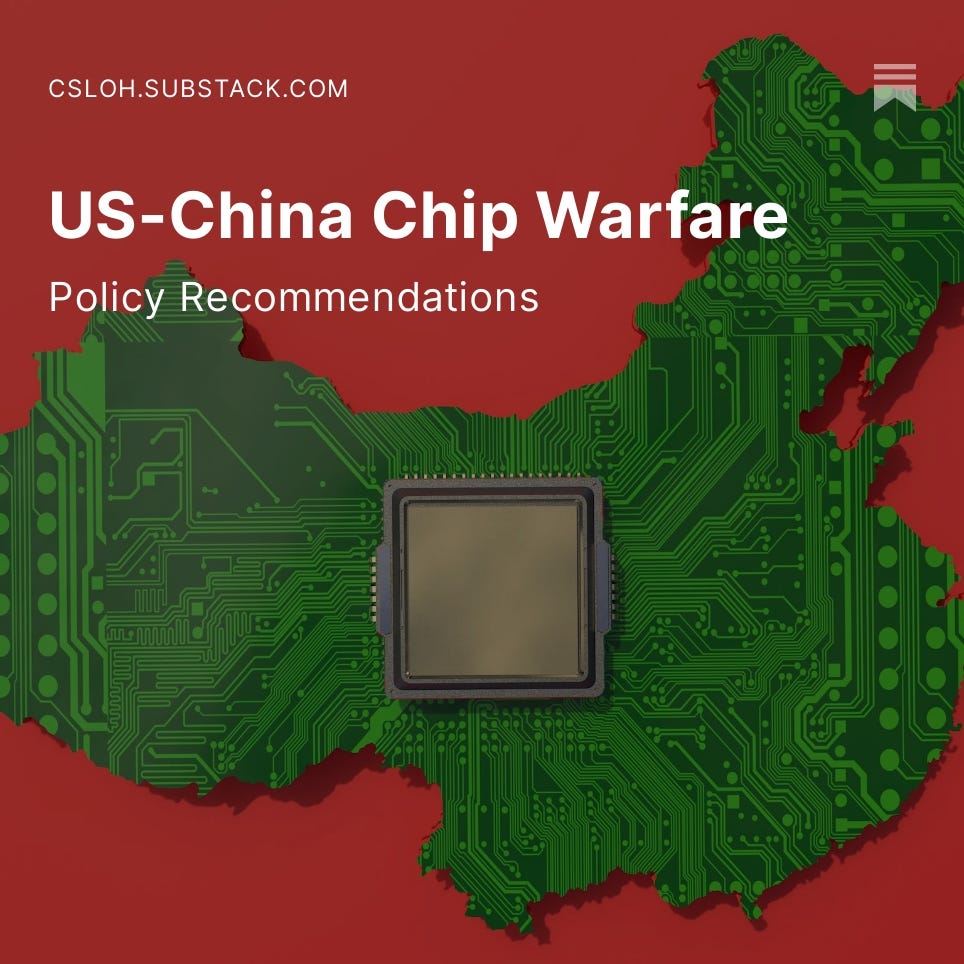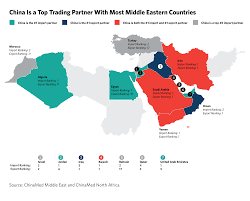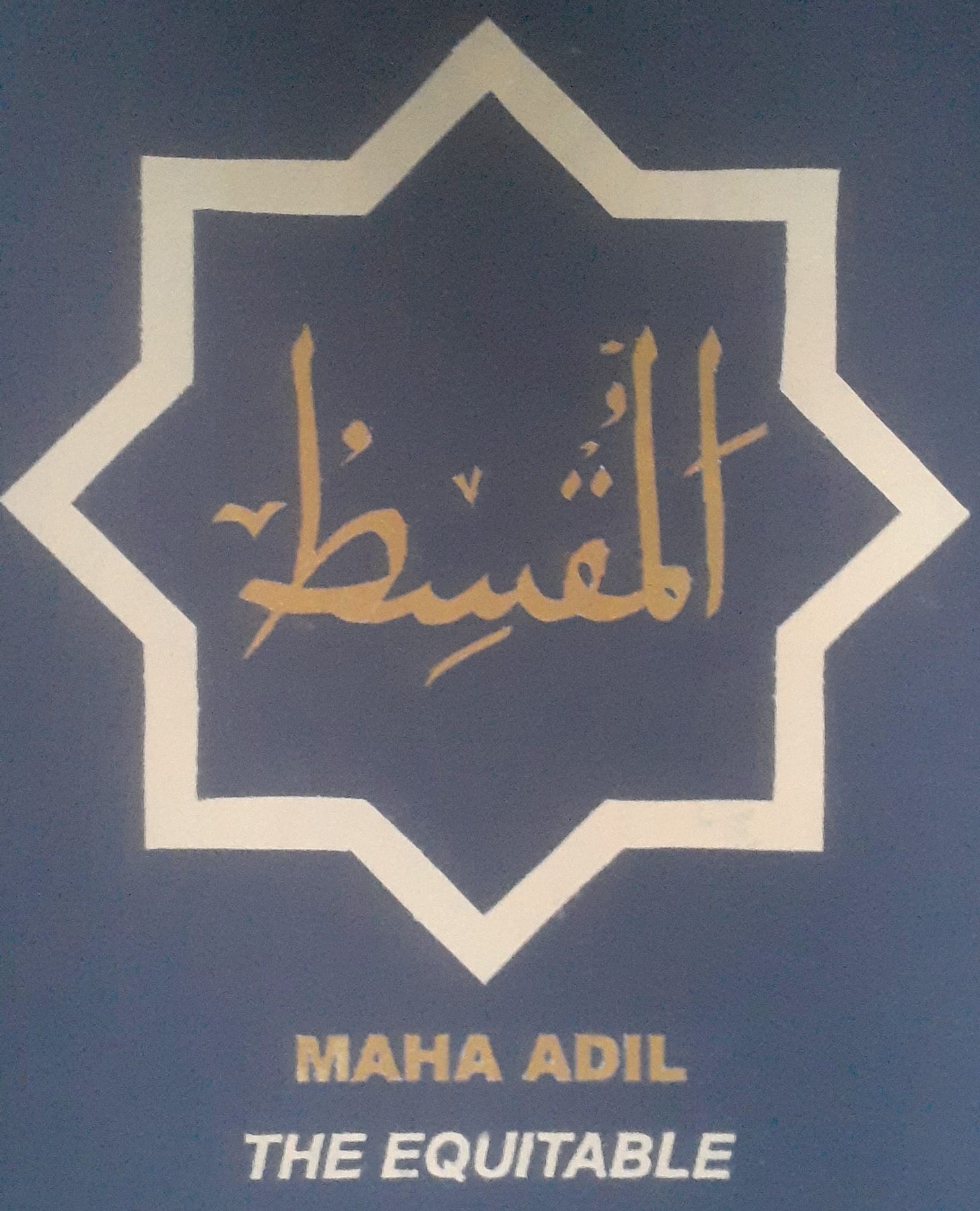#23 GEOECONOMICS in GEOPOLITICS
Coups in Aftica; China-US chip war; Palestine and China; East is still Red; a MADANI conversation
1] THE COUPS in AFRICA
NIGER ANTI-IMPERIALIST COUP
BURKINA FASO ANTI-COLONIALISM COUP
A coalition of 14 trade unions - Unité d’Actions Syndicales du Niger (UAS-Niger) - had demanded the withdrawal of French troops in Niger. The UAS-Niger had supported the coup and to call on Nigeriens to rally behind the CNSP (National Council for the Safeguard of the Homeland).
The CNSP further demanded the termination of five military agreements signed with France between 1977 and 2020, that allowed her former coloniser to station up to 1,500 troops in the country.
Across the Sahel - in a region defined as the ecoclimatic and biogeographic realm of transition between the Sahara to the north and the Sudanian savanna to the south - the youths are restless.
So are the soldiers.
Female Congolese soldiers
The region is in an unprecedented wave of coups d’état that have followed each other within a short period of time: within a year or so, five coups d’état have successively rocked Mali, Chad, Guinea, and Burkina Faso in widespread unrest, (Review of African Political Economy).
The continuance instability is the accumulated effects of decades of deforming neoliberal reforms that have eroded the social fabric, the surging significance of a politicized, young generation of Africans that do not share the same political empathy nor socio-economic culture as their elders, and the massive failure of the “war against terror” in the Sahel - which is no more than transnationals’ neoimperial mode of resource extractions - has produced neither social welfare (food security and human development), security nor stability. The fierce maintenance of geopolitical battles are more likely than not to furtherance in wreaking havoc in the African continent. The Western hegemonic influences may decline in the region, but former colonialists are attempting to cling and clasp to their imperial strongholds to prolong sustainability.
Within these situational conditions, between April-August 2020, massive crowds gathered in Bamako and in major Malian cities to denounce endemic misrule, a series of corruption scandals involving specifically the purchase of military equipment amid insecurity across the country. The government of Ibrahim Boundaries Keita had also been marred by the accusation of massive fraud in the legislative elections of March 2020. Mali’s security situation had deteriorated drastically since 2015. The country fell into a state of chronic instability with burgeoning violence coming not only from jihadist forces, but also from government-backed militias and self-defense groups. Following months-long popular mobilization led by the M5 RFP coalition – the 5 June Mouvement and the Rally of Patriotic Forces – crowds literally escorted the military to the presidential palace. These are the circumstances that saw the takeover of the National Committee for the Salvation of the People (CNSP) military council.
In Burkina Faso, days of uninterrupted public protest preceded the putsch last year. On 14 November, 2021, the country experienced the most brutal attack on security forces. Fifty-three gendarmes were killed in Inata. The public later learned with dismay that the exhausted gendarmes had been without food and supplies for days and could not withstand the ambush. Inata eventually sealed the fate of the president Roch Kaboré. This wasn’t the first recent coup in Burkina Faso. In 2014, months-long street protests culminated into the resignation of 27 year-reigning Blaise Compaoré. Compaoré fled to Cote d’Ivoire where the Ouattara government offered a safe haven against demands for his extradition to Burkina Faso to face justice in the trial on the murder of Thomas Sankara. The military transition that ensued enabled the organization of relatively free elections for the first time in post-independence Burkina Faso.
France is neither ready nor willing to deal with its former African colonies on equal footing. For a long time, it has relied upon clientel relationship to ensure sustained access to African minerals for an unfair price. The maintenance of compliant regimes was always the condition for unimpeded access and control, (see also Chandra Muzaffar, Niger: A Coup Against French Control And Dominance).
As an instance, there is defined geopolitical and definitive geostrategic reason for the French to seek to institute a buffer zone in Northern Mali. Kidal is about 300 km from Arlit where French giant ORAN (former AREVA) exploits uranium yellowcake. There are also important uranium reserves to the south of Arlit in addition to strategic minerals, arable land and water. The maintenance of military forces in Northern Mali therefore becomes the condition for continuing to supply its nuclear plants.
Meanwhile, in 2020, the U.S. Embassy confirmed in a fact sheet entitled “Expanded U.S. Engagement in Burkina Faso” that “over 3,000 Burkinabe soldiers and gendarmes are direct recipients of U.S. training and equipment programs each year, including peacekeeping training.” (The Grayzone, 8/11/22).
President Roch Kaboré led the country until January this year when he was deposed by Colonel Paul-Henri Damiba. U.S.-based researcher Nick Turse notes that like his predecessors, Damiba had also enjoyed U.S. training under Flintlock, the State Department’s Africa Contingency Operations Training and Assistance Course, the Military Intelligence Basic Officer Course-Africa, and the Pentagon’s Civil Military Support Element.
Further, the importance of Russia’s growing presence in Africa has to be said. Russia supplies weapons and military equipment to 30 African countries. Russia is said to be the largest supplier of weapons to Africa of the past few years, (Amy Niang, African Institute in Sharjah, 2023; see idea.int; fpri.org; the conversation).
The Progressive International stands against punishing the Nigerien people with sanctions and foreign intervention. Denying the Nigerien people food, medicine and electricity is a crime. We call on progressive forces around the world to join the growing call for de-escalation, diplomacy, and peace.
While PKU scholar Lu Feng took a nationalistic self-reliance approach in the above posted article, Qu Yongyi (曲永义) – Deputy director and party committee secretary at the Institute of Industrial Economics, Chinese Academy of Social Sciences (CASS); Professor, University of Chinese Academy of Social Sciences (UCASS) - is of an opinion that
“Self-sufficiency' [自给自足] has naturally become the guiding principle for the development of [China's] strategic industries … However, once China's IC industry [starts] moving towards frontier technologies such as 5nm and 3nm [chips], and its products approach high-end usage, import substitution across the whole of the industrial chain may result in the ‘fallacy of composition’ – i.e. import substitution is reasonable for each [individual] segment of the industrial [chain]. But if it is pursued in all parts of the industrial chain, it may impede the development of the industry. This is because, as the core technologies of high-precision products in strategic industries are extremely complex and cutting-edge, it is impossible for any country to dominate all, or even most, of the parts of the industrial and innovation chains … [We should] promote the formation of two major division-of-labour systems [两大分工体系] led respectively by the United States and China, with Eurasian countries maintaining a neutral stance [持中间立场] and taking part [in both]. Only in this way will the development of China's strategic industries be able to shift from a low-standard approach of ‘passive security + closed development’ to a high-standard one of ‘proactive security + leading development’.”
Source: International Economic Review No.4 (July 2023).
3] PALESTINE with CHINA; LIBERATION FORCES in PALESTINE
To be expressed is that China's approach to the Middle East geopolitical issues tends to advocate the establishment of an inclusive mechanism. China's stated proposition contains two basic elements: one is to solve problems by means of peaceful diplomacy; and the other is to focus on key developmental factors that are associated with security issues, that is, to promote security through development.
Indeed, China’s involvement in the Middle East has reshaped the region’s landscape, expanding beyond traditional energy sources to encompass economic, geopolitical, and strategic considerations, (Mohammad Eslami and Maria Papageorgiou, China’s Increasing Role in the Middle East: Implications for Regional and International Dynamics).
The kind of security commitment by the US to its partners and allies in the Middle East embraces a string of military bases, arms sales, as well as cooperative participation through the US’s major non-NATO allies (MNNA). Looking at this angle, one can see that this design layout has not really translated into a security architecture that includes all of the Middle East. Indeed, Iran, as an example, has had no place in it so far, and even some Arab countries (such as Sudan) have been excluded.
In fact, this approach is similar to the US’s approach in the Asia-Pacific,(read US Indo-Pacific Strategy), that is, small and exclusive multilateral mechanisms are increasingly being established in the region. In practice, however, this is not helping to resolute the Middle East regional problems. On the contrary, this has had exacerbated tensions and introducing more conflicts in the region.
There is a general agreement, however, that the global order is transforming, but to consolidate and expand its global influence and power, the US is keen and anxious to keep its ‘vassal’ and ‘client’ states compliant, to prevent the creation of coalitions that may challenge US supremacy, and to prevent the rise of more powerful challenging states.
Niu Xinchun (牛新春) and Qin Tian (秦天), respectively the director and deputy director of the Institute of Middle East Studies at China Institutes of Contemporary International Relations (CICIR) have this to say:
“In this new period of turbulent changes, the importance of Sino-Arab mutual support on the international political stage has once again been highlighted. The Arab world's quest for strategic autonomy requires the support of major powers rather than intervention. The United States does not want to invest real money in the Middle East and interferes in Arab internal affairs using the pretext of human rights, women's rights and labour rights. China firmly supports Arab [countries’] strategic autonomy and [their] pursuit of their own paths in terms of human rights, political systems and ideologies.
“Similarly, at a time when the US is continuing its containment and oppression of China, Arab countries are firmly supporting us in safeguarding our sovereignty, security and development interests. Particularly valuable is that the Arab world, where Islam was born, has played a positive, exemplary and leading role by firmly supporting our policy stance on Xinjiang-related issues.”
“In future, China and Arab countries should explore the international strategic value of their cooperation further and continue to support each other's core interests. At the same time, we should cooperate and coordinate more on issues such as human rights, ideology and civilisational views, and we should lead the international community in building a new type of international relations, [so as to] counter hegemony, high-handedness and bully-like behaviour [反制霸权霸道霸凌行径].”
A Reminder:
A Review of Carlos Martinez's book - Chinese Socialism in the 21st Century
Book Launch
Sunday, August 13
5] A CONVERSATION WITH THE MADANI ECONOMIC NARRATIVE
where the impact of madani-zation of Malaysia's economic development is also enquired (the substack link has since become inaccessible; though the article piece is available at mysinchew) by Lim Teck Ghee, Murray Hunter and Ramesh Chander on some implications of expanding role of the Malaysian Islamic Development Department (JAKIM) in its economic planning, too.
The authors expressed:
The staff at JAKIM are primarily educated in Islamic studies, rather than economics. Thus, there will be an Islamic orientation around the advice given. The development of Islamic economy as a discipline is still in its infancy. There are no country Islamic economic models to look at and learn from.
The major question is whether the organization is actually technically and scholarly equipped to perform the role that the country demands from such a religious entity.
Since its establishment in 1997, by 2018 taxpayers were contributing RM810 million to JAKIM’s operating budget and this had raised concerns as it had ballooned from RM582 in 2011. Since then, the allocations for managing Islamic affairs has increased every year, from RM1.2 billion in 2019 to RM1.3 billion in 2020, RM1.4 billion in 2021 and RM1.5 billion in 2022.
Not only is there likely to be little value added in the economic planning machinery and process but there is also the danger that new political and religious cronies and distributional coalitions will piggyback on Jakim’s enhanced role.
Examples could include a push for Madina related big ticket procurement contracts in budgets in education, socio cultural ministries, GLC, etc. This could be the tip of a costly iceberg to be paid by all Malaysian taxpayers.
More than a serial systemic of incompetence but dominant upper class holdups, as long as fundamental problems of economic sovereignty is behested to Global North monopoly-capital; of the nation's incapacity to raise financial resources internally where the tax base is shallow yet favouriting compensations and reliefs endowed to the capital class; that the provision in social services to the rakyat2 population are unequal, and unresolved, through misdirection and or odious misappropriations - any gearing to elections shall merely enable a change of political guards to run the same derelict and moribund institutions as during the past 65-year with different governing regimes.
Thus, any question relating to JAKIM is to ask what the concept of MADANI means in economics. Presently, there are as yet no scholarly papers or models available to structure any future planning. Does this mean that by default, JAKIM will be left to define the economic principles and developmental contents - in the country’s retarded growth path under a monopoly-capitalised praxis -within MADANI?
Compiled content-links to contemporary geopolitical and geoeconomics perspectives:
FRIDAY FILES 11/08/2023
Circulate this journal to peers and diaspora communities
Thanks a plenty.



